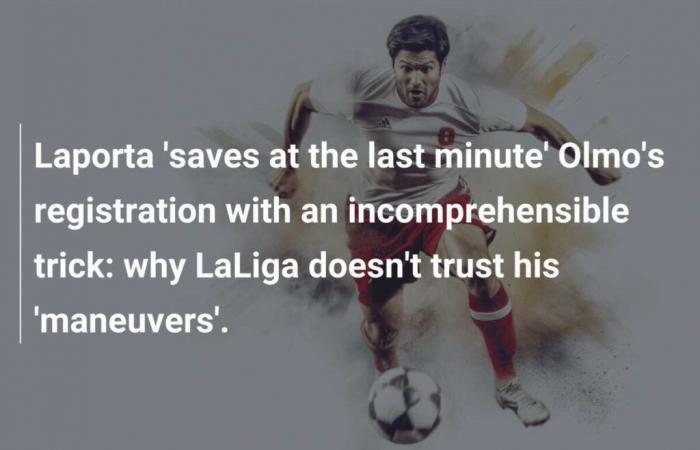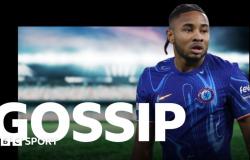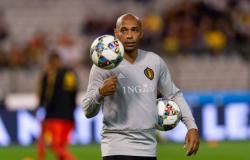
More information. FC Barcelona exhausts its last legal option to register Dani Olmo and bets everything on a new lever from Laporta.
Barça is at the center of one of the most embarrassing chapters in its history and, despite this, it could still fail to register Dani Olmo and Pau Víctor. December 31 was the deadline, and as has become customary for the Blaugrana board, they left their duties for the last minute.
The problem for Hansi Flick and the Culés fans is that it remains uncertain after New Year’s Eve whether Dani Olmo and Pau Víctor will continue to wear the FC Barcelona jersey for the rest of the season. Laporta uses a new lever, a formula which has never failed him in extreme situations. Once again, Barça’s assets are mortgaged.
On Saturday morning, Joan Laporta finalized an agreement with Qatari investors for the sale of VIP boxes at the future Spotify Camp Nou for the next 20 years, worth 100 million euros. Barca kept LaLiga informed of this operation at all times, but this time Tebas and his team stood firm and let them know that they would only process the registrations once the club received the funds from Qatar.
Read more:
Liverpool Transfer Strategy: January Window Outlook and Contract Updates
LaLiga conditioned Barca’s registration on certification that the club had received funds from Qatari investors. These recent maneuvers differ significantly, because with previous levers, LaLiga processed player registrations even when Barca had not yet received the money from the investment funds that had purchased part of the club’s assets.
Bartomeu left a debt of 1.35 billion euros according to the consultancy firm hired by the current president, a situation that left Barça “in intensive care”, in the words of Laporta. Barça does not plan transition years; The Blaugrana team is obliged to compete in all competitions and aim for big titles every season. This is why Laporta has had to resort to six levers since returning to the presidency in March 2021.
Read more:
William Saliba: The defender targeting Real Madrid’s defense
The absurd occurred after 9:00 p.m. on December 31, when LaLiga announced in a statement that “FC Barcelona has not presented any alternative which, in accordance with LaLiga’s financial control regulations, allows it to register a player from January 2 next.”
The announcement from Football’s governing body contradicted FC Barcelona’s statement, which claimed that “FC Barcelona has requested a new license from the Royal Spanish Football Federation (RFEF) for players Daniel Olmo and Pau Víctor.”
Additionally, they denied having “requested or received any extension of time from any other agency regarding the registration in question.” With this exchange of statements, 2024 ends without clarifying the future of the two footballers and the very different versions of the two parties.
Read more:
Cup Glory with High Stakes
The first lever executed by Joan Laporta occurred in June 2022 with the sale of 10% of LaLiga television rights for the next 25 years to Sixth Street, a Californian investment fund which also owns shares of the San Antonio Spurs in the NBA and collaborates with Real Madrid in Spain. Barça received proceeds of 267 million euros, managing to save the accounts for the 2021-22 fiscal year.
Just a month later, the president activated the second lever by selling another percentage of television rights to Sixth Street, this time a 15% stake worth 400 million euros, also for the next 25 years; in other words, Sixth Street now owns 25% of Barça’s television rights.
Read more:
Real Madrid: Our wishes for the Merengues in 2025
The transactions with the California investment fund produced the expected results, without causing any problems with the transaction. Barça was ultimately expected to receive the funds within the agreed time frame; However, Laporta continued to pull levers. In August, Barça activated the third and fourth levers, although these operations did not prove as effective as the previous ones.
Via Bridgeburg Invest, the club sold 49.5% of Barça Studios: 25% was sold to ‘Socios.com’, while the remaining 24.5% went to Orpheus Media, a company run by Jaume Roures, a shareholder of Mediapro, one of the main providers of VAR in the world.
This operation saw Barça receive 200 million euros, with each entity providing an initial payment of 10 million euros and the rest in three different installments of 30 million euros. Both ‘Socios.com’ and Orpheus Media respected the first payment, but did not make subsequent payments.
Read more:
Premier League Stars in the Spotlight as Contract Negotiations Open Today
Roures admitted “not having violated any commitment made with the purchase of a stake in Barça Studios”, but the remaining 90 million euros for the 24.5% of shares purchased by Orpheus Media did not reach the blaugrana club. In fact, to date, Barca have only received 65 million euros of the 140 million they should have received at this stage.
Faced with this situation, Libero Football Finance intervened. The German investment fund agreed to pay 60 million euros for a third of the shares acquired by ‘Socios.com’ and Orpheus Media, which had not been settled. Meanwhile, the Cypriot fund Vestigia (Nipa Capital) buys a portion of the shares of Barça Studios acquired by Libero for 20 million euros, while Libero decides not to pay the remaining 40 million euros.
This non-payment puts Aramark at stake, a catering and hospitality service that covers the 40 million euros left unpaid by Libero Football Finance, thus also acquiring part of the shares of Barça Studios.
Read more:
Mario Abrante looks back on his time at Real Zaragoza: ‘We were close to promotion’
The deal for the sixth and final lever for Barça was concluded on Saturday (although the club has not yet made it official) with the sale of VIP boxes at the Spotify Camp Nou for the next 20 years for 100 million euros . However, the deal did not prove to be as effective, while initially Barca hoped to sell the seats in June and renegotiate the contract for greater financial benefit.
Initially, Barca expected to receive around 200 million euros, but they will ultimately end up with half that amount, or 100 million euros, from the sale of seats over the next 20 years to a Qatari company .
To have a little margin during transfer windows and register players, Barça presents to LaLiga a viability plan based on the results of operations concluded with investors. The sporting body gives the green light to the club to sign, even if the leverage money may not arrive.
Having counted on the funds from the levers in advance and not having paid the amounts on time, Barca fell into debt to LaLiga up to 100 million euros. This led to their failure to meet the 1:1 rule, having exceeded the salary cap and failing to comply with Financial Fair Play.
“Barcelona is the only club in the world that has no money, but ends up buying any player it wants. I don’t know how they do it. It’s a bit strange, a bit crazy,” admitted Julian Nagelsmann, then coach of Bayern Munich.
In 2022, when Barça’s finances were “in intensive care”, according to Laporta, the club brought in Lewandowski, Koundé and Raphinha for 160 million euros. Thanks to the agreement with Orpheus Media, the club was able to register all three players. The deals with Libero Football Finance and Nipa Capital allowed them to register Gündogan, Balde and Araujo, although the investors later withdrew. Still, LaLiga president Javier Tebas processed the players’ registrations.





